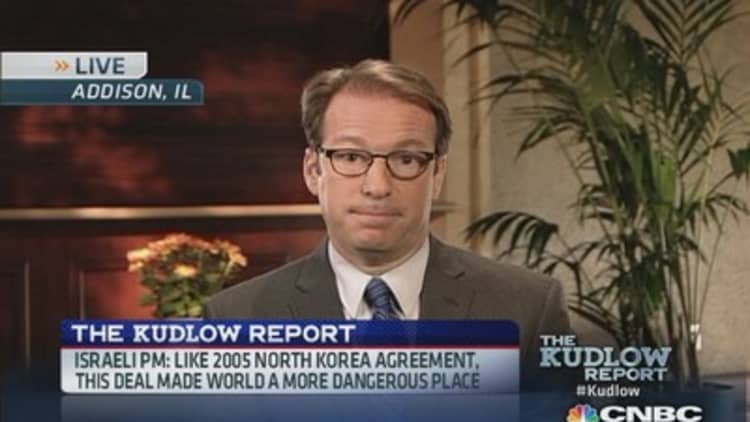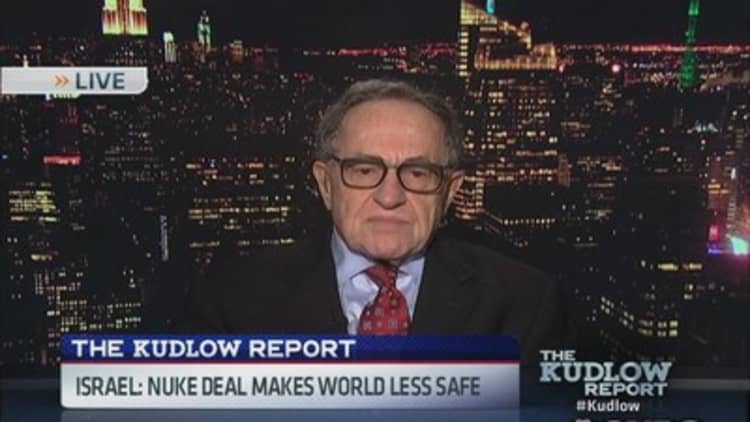
President Barack Obama is forcefully defending the temporary agreement to freeze Iran's disputed nuclear program and pushing back against the skepticism voiced by members of Congress and some American allies.
During a fundraising event in San Francisco on Monday, the president took a swipe at those who question the wisdom of engaging with Iran.
"Tough talk and bluster may be the easy thing to do politically, but it's not the right thing to do for our security," he said.
(Read more: Nuke deal sanctions relief will do little for Iran)
But House GOP Chief Deputy Whip, Rep. Peter Roskam, R-Ill., expressed why many in Congress, both Republican and Democrat, have publicly criticized the deal.
"This is giving the Iranians a benefit, and you get nothing in exchange. … Right now, the stated U.S. policy is to prevent Iran from becoming a nuclear power, period," Roskam told CNBC's "The Kudlow Report" on Monday. "This begins to transition into something that looks more like containment that is a very, very difficult and often doesn't end well."
It was a mistake for the administration to move forward with negotiations the way it did, he said.
"It becomes a dangerous game for the administration to move forward without consulting Congress. Congress is a co-equal branch of government and has a role to play in foreign affairs," Roskam said. "When the president has a leading ally in the Senate—that is Sen. Schumer and Sen. Menendez—[who] are having none of this, I think he's got major, major problems."
In fact, Senate Foreign Relations Committee Chairman Sen. Bob Menendez, D-N.J., is working on a bill to reinstate the full force of sanctions with the threat of new ones if Iran doesn't scale back its nuclear program.
Menendez reportedly hopes to have a bipartisan bill, co-sponsored by Sen. Mark Kirk, R-Ill., ready for other lawmakers to consider when the Senate returns Dec. 9. The Kirk-Menendez measure would require the administration to certify every 30 days that Iran is adhering to the terms of the six-month interim agreement and that it hasn't been involved in any act of terrorism against the United States.
(Read more: Senators press ahead on new sanctions for Iran)
"The Iranians were given a breath. They've got billions of dollars, and they're able to move forward now with the sure knowledge that the precedent has been set that they get paid to manipulate everybody on the world stage," Roskam said. "We ought not play that game, and we ought not enable the administration when they choose to play that game."

Others have objected, as well. Israel Prime Minister Benjamin Netanyahu, who believes Iran is determined to produce a nuclear bomb, has strongly condemned the deal reached by Iran and world powers over the weekend in Geneva. Israel will send a team to the U.S. next week to work on a final nuclear deal with Iran.
Harvard Law professor Alan Dershowitz, a leading supporter of Israel, said the deal was poorly negotiated.
"I think it's a bad deal, not motivated by any bad intentions ... [or] by anti-Israel attitudes. It's a miscalculation, and it's bad negotiating tactics," he said on "The Kudlow Report" on Monday. "I think you always should negotiate from strength. We had the Iranians where we wanted them. The sanctions were really working."
Dershowitz, whose new book is "Taking the Stand," says the agreement will do more to harm U.S-Israeli relations than to curb Iran's nuclear ambitions.
"The Iranians are jumping up and down with joy. They think they have won. They think the United States has lost. Their goal is to drive a wedge between the United States and Israel, and they have succeeded," he said.
"I hope that the Congress hangs two swords of Damocles over Iran, making it clear that if they violate this agreement and move surreptitiously toward nuclear weapons they will authorize the president to take whatever military action is necessary," Dershowitz said. And second, ratchet up the sanctions in the event no deal is [in place] six months from now."
—By Ben Thompson, with AP

